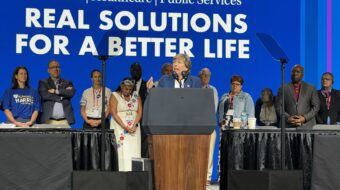
WASHINGTON—Under federal labor law, companies and their union-busters are supposed to disclose, with some exceptions, how much they spend to stop organizing drives. Starbucks and its union-buster, Littler Mendelson, haven’t, so the Service Employees are demanding the Labor Department force them to do so.
The information is relevant to Starbucks Workers United, the SEIU affiliate which is aiding the Starbucks workers from coast to coast in their from-the-ground-up organizing drive at the giant coffee chain’s stores.
SWU has won union recognition votes at 370 stores and counting, Casey Cabalquinto, the union’s senior research coordinator, told DOL. But with union-buster coaching, Starbucks not only tries to stop the workers from organizing but refuses to bargain with them when they do so.
Such advice isn’t cheap. It’s also relevant. So Starbucks workers should know how much their bosses are paying for the expensive campaign to stop their organizing drive. Hence the union’s letter to the Labor Department.
Top “persuader” in the country
Littler has advertised itself as the top “persuader” against unions in the country. In the Starbucks campaign, it’s loaded workers at three New York stores and one in La Quinta, Calif., with 21-count subpoenas, allegedly for information but really for intimidation, Cabalquinto wrote.
Cabalquinto sent his letter on January 23 to DOL’s Office of Labor-Management Standards, which enforces that disclosure section of one labor law, the 1959 GOP-enacted Landrum-Griffin Act (LMRDA) against the union-busters, officially called “persuaders.”
“The nature of the information and documents requested demonstrate a clear objective of supplying Starbucks with detailed information about employees and the union,” he wrote.
“The Buffalo ALJ (administrative law judge) decision held the subpoenas were largely not relevant” to the NLRB’s demand for an enforceable injunction, called a 10(j), at one store in LaQuinta, Calif., where Starbucks tried to intimidate two workers. The LaQuinta case wound up in Buffalo because that’s where the workers’ campaign—and company resistance—began.
Starbucks’s wide-ranging subpoenas of the workers also broke labor law. “An employer may not surveil its employees to obtain such information and may not give its employees the impression that it has surveilled—or will surveil—them to obtain such information,” the letter to DOL added.
“The subpoenas Starbucks and Littler filed in other cases appear to similarly violate workers’ rights. These other cases indicate Starbucks and Littler may be utilizing overly broad and abusive subpoenas for anti-union purposes in multiple cases beyond LaQuinta and Buffalo.” Those include cases in Great Neck, Long Island, and New York City.
Starbucks and Littler Mendelson’s law-breaking is so widespread against the Starbucks workers and SWU that the Labor Department has already gone to court once “to enforce a subpoena against Starbucks seeking information about company spending to fly corporate officers to Buffalo” to stop the unionization drive there. The coffee giant and Littler also spent money to create an anti-union website, the letter added.
If labor law’s disclosure provisions are “to have any force, employers cannot be permitted to issue broad and invasive subpoenas and then hide behind the ‘discovery’ exception to avoid disclosures,” Cabalquinto declared.
“Because Starbucks retained Littler to engage in activities falling squarely under” the disclosure sections of Landrum Griffin which cover such “persuaders,” both “must disclose any agreements under which Littler issued discovery requests on behalf of Starbucks and any expenditures and payments in connection with those requests.”
When organized labor introduced the Protect The Right To Organize (PRO) Act in 2021, it included the mandated “persuader” financial disclosures SEIU’s Cabalquinto discussed.
Corporate interests opposed disclosing the “persuader” spending, but so did the American Bar Association. It said the PRO Act provision would violate client-lawyer confidentiality. A business-backed Republican filibuster threat, plus opposition from swing Sen. Joe Manchin, D-W. Va., killed the PRO Act, including the “persuader” disclosure.
We hope you appreciated this article. At People’s World, we believe news and information should be free and accessible to all, but we need your help. Our journalism is free of corporate influence and paywalls because we are totally reader-supported. Only you, our readers and supporters, make this possible. If you enjoy reading People’s World and the stories we bring you, please support our work by donating or becoming a monthly sustainer today. Thank you!












Comments